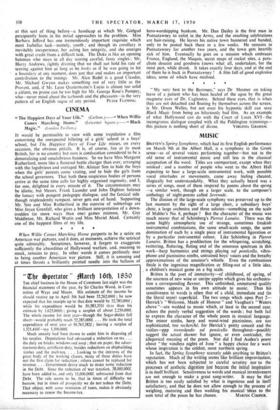MUSIC
BRITTEN'S Spring Symphony, which had its first English performance on March 9th at the Albert Hall, is a symphony in the Greek sense—as of several voices performing together—but not in the old sense of instrumental music and still less in the classical acceptation of the word. Titles are unimportant, except when they mislead ; and a number of people who went to the Albert Hall expecting to hear a large-scale instrumental work, with possible vocal interludes or movements, came away feeling cheated, illogically but understandably. What they actually heard was a series of songs, most of them inspired by poems about the spring —a similar work, though on a larger scale, to the composer's anthology of night-poems called Serenade.
The illusion of the large-scale symphony was preserved up to the last moment by the sight of a large choir, a subsidiary boys' choir, a large orchestra and three soloists—something on the scale of Mahler's No. 8, perhaps ? But the character of the music was much nearer that of Schonberg's Pierrot Lunaire. There was the same highly atmospheric use of strange, sometimes freakish instrumental combinations, the same small-scale songs, the same domination of each by a single piece of instrumental figuration or by a particular instrumental colour. Like Schonberg in Pierrot Lunaire, Britten has a predilection for the whispering, scratching, twittering, fluttering, fluting end of the sonorous spectrum in this work—harp harmonics and strings playing sul ponticello, vibra- phone and pianissimo ninths, untrained boys' voices and the breathy approximations of the amateur's whistle. Even the rumbustious finale is the ingenious magnification or filling-out of a little idea, a children's musical game on a big scale.
Britten is the poet of immaturity—of childhood, of spring, of the sourness of new wine or unripe apples which gives his orchestra- tion a .corresponding flavour. This unfinished, unmatured quality sometimes appears in his own attitude to music. Thus his sensitiveness to words is often that of a child, immediate and (in the literal sense) superficial. The two songs which open Part 2- Herrick's " Welcome, Maids of Honour " and Vaughan's " Waters above "—are wedded to music which, at least in the second case. echoes the purely verbal suggestion of the words ; but 'both fail to express the character of the whole poem in musical language. The minor ninths, harp and wood-wind pianissimo, are too sophisticated, too recherché, for Herrick's pretty conceit and the violins—ppp tremolando sul ponticello throughout—possibly suggest the actual shower but ignore, or even contradict, the allegorical meaning of the poem. Nor did I find Auden's poem about " the windless nights of June " a happy choice for a work whose inspiration is the coldest, most northern spring.
In fact, the Spring Symphony scarcely adds anything to Britten's reputation. Much of the writing seems like brilliant improvisation, which has not been subjected to careful scrutiny nor to the processes of aesthetic digestion just because the initial inspiration is in itself brilliant. Sensitiveness to words and musical inventiveness are not enough to make a great song-writer. It may be that Britten is too easily satisfied by what is ingenious and in itself satisfactory, and that he does not allow enough to the process of weighing, maturing and then wedding his musical -ideas to the sum total of the poem he has chosen. MARTIN COOPER.


































 Previous page
Previous page